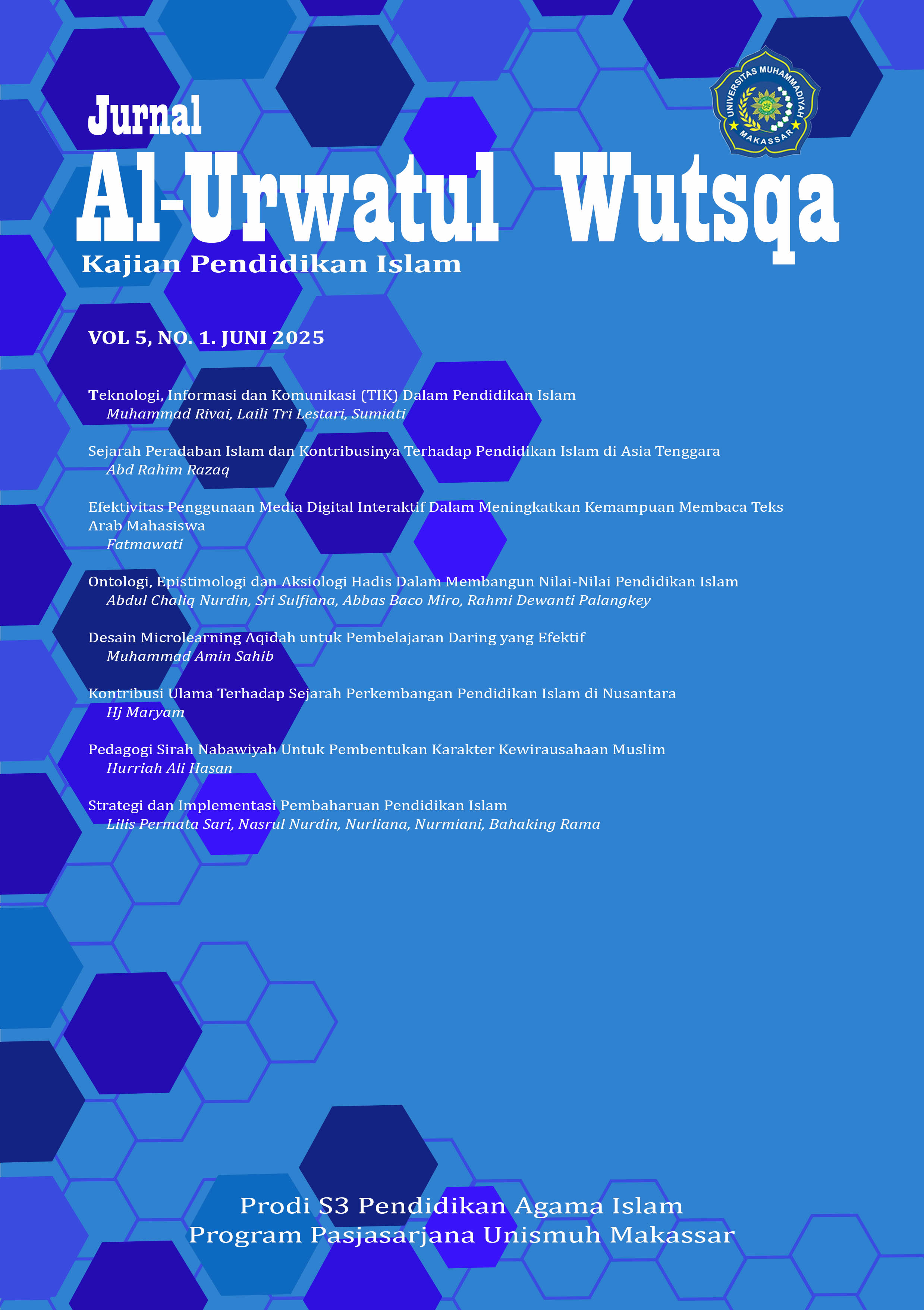Desain Microlearning Aqidah untuk Pembelajaran Daring yang Efektif
Microlearning, Aqidah, Pembelajaran daring, Multimedia learning
Abstract
Tulisan ini menawarkan rancangan komprehensif microlearning untuk mata pelajaran Aqidah pada pembelajaran daring level SMA/MA dan perguruan tinggi keagamaan. Desain menggabungkan prinsip cognitive load theory (CLT), teori pembelajaran multimedia, serta strategi retrieval practice dan spaced learning guna meningkatkan retensi konsep dan transfer nilai. Artikel memaparkan: (1) rasional teoretik microlearning untuk materi konseptual-normatif Aqidah; (2) model pengembangan berbasis ADDIE dengan validasi ahli dan uji coba terbatas; (3) arsitektur modul mikro berdurasi 5–8 menit yang menerapkan prinsip-prinsip multimedia (segmentasi, koherensi, modality, dan signaling); (4) skema penjadwalan bertahap 1–2–7 hari untuk penguatan memori; (5) paket asesmen formatif-sumatif yang memfasilitasi praktik penarikan kembali (kuis rendah-taruhan, exit ticket, refleksi singkat) dan indikator internalisasi nilai. Literatur mutakhir menunjukkan microlearning secara umum berdampak positif pada hasil belajar dan keterlibatan, khususnya pada setting digital dan mobile, selama desainnya mengelola beban kognitif dan menyediakan praktik peninjauan terjadwal. Temuan sistematis juga menguatkan efektivitas retrieval practice dan spaced learning pada peningkatan retensi, yang relevan untuk topik akidah yang menuntut pemahaman konsep serta pembentukan disposisi religius. Blueprint yang diajukan siap diadaptasi oleh guru PAI/dosen Ushuluddin, dan disertai rencana evaluasi (pretest-posttest, CVI ahli, SUS, dan skala usaha mental Paas).
References
Agarwal, P. K., Nunes, L. D., & Pan, S. C. (2021). Retrieval practice consistently benefits student learning: A systematic review of applied research in schools and classrooms. Educational Psychology Review, 33, 1409–1453.
Albus, P., et al. (2023). The modality effect reverses in a virtual reality learning environment. Instructional Science.
Balasundaram, S., & Elangovan, S. (2024). Microlearning and learning performance in higher education. Journal of Educational Technology Systems, 53(1), 1–24.
Baxter, K. A., et al. (2025). The application of cognitive load theory to the design of health programs. BMC Health Services Research. (Open-access overview of CLT applications).
Bego, C. R., et al. (2024). Single-paper meta-analyses of the effects of spaced retrieval practice in STEM courses. International Journal of STEM Education, 11, 62.
British Journal of Educational Psychology. (2024). Re-examining cognitive load measures in real-world learning (ESM study using single-item effort/difficulty). BJEP.
Capili, B., et al. (2024). An introduction to the quasi-experimental design. Nursing Open.
Dalawi, I., et al. (2023). Content & face validity analysis. BMC Public Health.
Denojean-Mairet, M., et al. (2024). A literature review on the integration of microlearning and social learning. Smart Learning Environments, 11, 27.
Deshmukh, A. M., et al. (2024). Validation of System Usability Scale as a usability metric. PLOS ONE, 19(3), e0299266.
Endres, T., et al. (2025). Developing the Mental Effort and Load–Translingual Scale (MELTS). Educational Psychology Review.
Haavisto, M., et al. (2023). Do old explanations for the modality effect apply in a new age of multimedia learning? Computers & Education.
Hilsmann, N., et al. (2025). Mobile microlearning in continuing professional development: A review. The Journal of Continuing Education in Nursing, 56(3), 121–128.
Kim, S. K., & Webb, S. (2022). The effects of spaced practice on second language learning: A meta-analysis. Language Learning, 72(1), 269–319.
Köhler, C., Hartig, J., & Naumann, J. (2021). Detecting instruction effects: Choosing between ANCOVA and change scores in nonrandomized studies. Educational Psychological Review.
Martinengo, L., et al. (2024). Spaced digital education for health professionals: Systematic review and meta-analysis. Journal of Medical Internet Research, 26(1), e57760.
Mayer, R. E. (2020). Multimedia Learning (3rd ed.). Cambridge University Press.
Mayer, R. E. (Ed.). (2022). The Cambridge Handbook of Multimedia Learning (3rd ed.). Cambridge University Press.
Monib, W. K., et al. (2025). Microlearning beyond boundaries: A systematic review and a novel framework for improving learning outcomes. Heliyon, 11(2), e41413.
Naidoo, N., et al. (2021). Design, implementation, and evaluation of a distance learning course: Experience with ADDIE. Frontiers in Public Health, 9, 726814.
Navarrete, E., Nehring, A., Schanze, S., Ewerth, R., & Hoppe, A. (2023). A closer look into recent video-based learning research: A comprehensive review. arXiv.
Noetel, M., Griffith, S., Delaney, O., et al. (2022). Multimedia design for learning: An overview of reviews with meta-meta-analysis. Review of Educational Research, 92(3), 413–454.
Ouwehand, K., et al. (2021). Measuring cognitive load: Are there more valid alternatives to Likert-type scales? Frontiers in Education, 6, 702616.
Paas, F., et al. (2020). Methods to manage working memory load in the learning of complex tasks. Current Directions in Psychological Science, 29(4), 394–398.
Perotti, L., et al. (2024). The usability and user experience of an interactive e-learning platform (SUS & UEQ). Universal Access in the Information Society.
Silva, E. S., et al. (2025). Contribution of microlearning in basic education: A systematic review. Education Sciences, 15(3), 302.
Simmons, C., et al. (2025). A scoping review of cognitive load assessment tools. The Clinical Teacher.
Skulmowski, A., & Xu, K. M. (2022). Understanding cognitive load in digital and online learning: A new perspective on extraneous cognitive load. Educational Psychology Review, 34(1), 171–196.
Spatioti, A. G., et al. (2022). A comparative study of the ADDIE instructional design model in distance education. Information, 13(9), 402.
Sweller, J. (2023). The development of cognitive load theory: Replication failures and a theoretical advance. Educational Psychology Review, 35, 1245–1268.
Trypke, M., et al. (2023). Two types of redundancy in multimedia learning. Frontiers in Psychology.
Wiley British Journal of Educational Psychology. (2024). Re-examining cognitive load measures in real-world learning (effort vs load). BJEP.
Wong, J. T., et al. (2024). Immediate versus delayed low-stakes questioning: Encouraging the testing effect through embedded video questions. Technology, Knowledge and Learning.
Zhang, L., et al. (2024). A systematic review of emotional design research in multimedia learning. Education and Information Technologies.
Downloads
Published
Issue
Section
License
Copyright (c) 2025 Muhammad Amin Sahib

This work is licensed under a Creative Commons Attribution-ShareAlike 4.0 International License.








